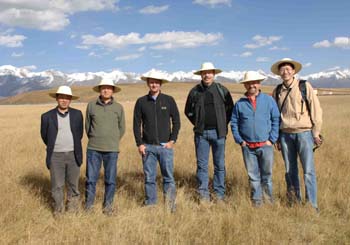Grassland management key to reducing poverty in China

Reducing poverty in a remote region of China was the focus of a meeting attended by international experts from the UK, Switzerland and China.
Professor Richard Bardgett and Dr Nick Ostle from the Lancaster Environment Centre and CEH Lancaster joined representatives from Chinese government agencies in Xining city to try to tackle overgrazing on the grasslands of the Qinghai-Tibetan plateau, which covers a quarter of the land mass of China.
The degradation of grasslands, compounded by climate change, is threatening the livelihoods of farmers and traditional yak herders in what is already one of the poorest regions of China.
Professor Bardgett, who is the project leader, said: "Our project aims to provide policy makers with an improved understanding of the causes of grassland degradation and its link to poverty in this region. We also aim to develop tools, based on sound ecological principles, which can be used to restore the grassland to a healthy state and therefore help to reduce poverty.”
The project has strong support from the Chinese national and provincial governments which are committed to reducing poverty in this region of China.
The project partners include Lancaster University, the Chinese Ministry of Agriculture, the Chinese Academy of Agricultural Sciences, the Chinese Academy of Sciences, the Qinghai Academy of Social Sciences, Qinghai University, CAB International, and NERC Centre for Ecology and Hydrology.
Professor Zhang Lijian from the Chinese Ministry of Agriculture said: “This project will greatly help us in delivering our new national five-year plans which includes better conservation of grasslands and more effective poverty alleviation in the Qinghai-Tibetan plateau region. In particular, better conservation and sustainable harvesting of Cordyceps (or caterpillar fungi), which has huge economic values, will be crucial to poverty alleviation in this region.”
The workshop was funded by a development grant from the UK Ecosystem Services and Poverty Alleviation programme, supported by the UK Natural Environment Research Council (NERC), Department for International Development (DIFD), and Engineering and Physical Sciences Research Council (EPSRC).